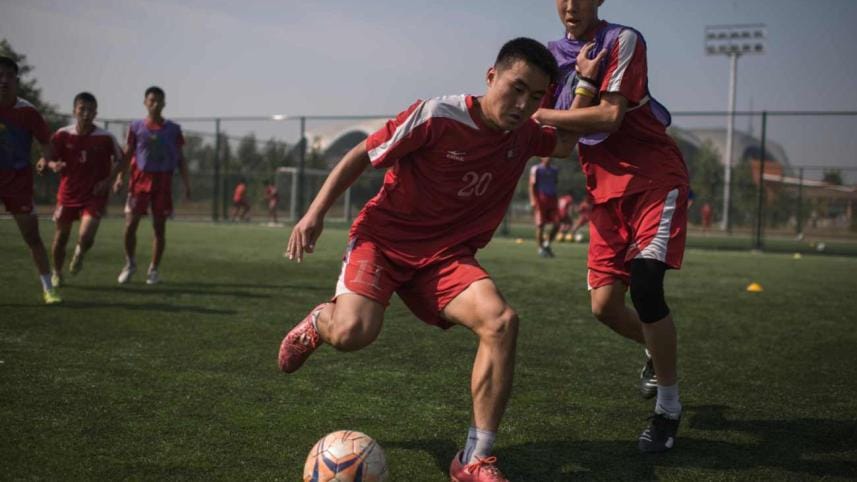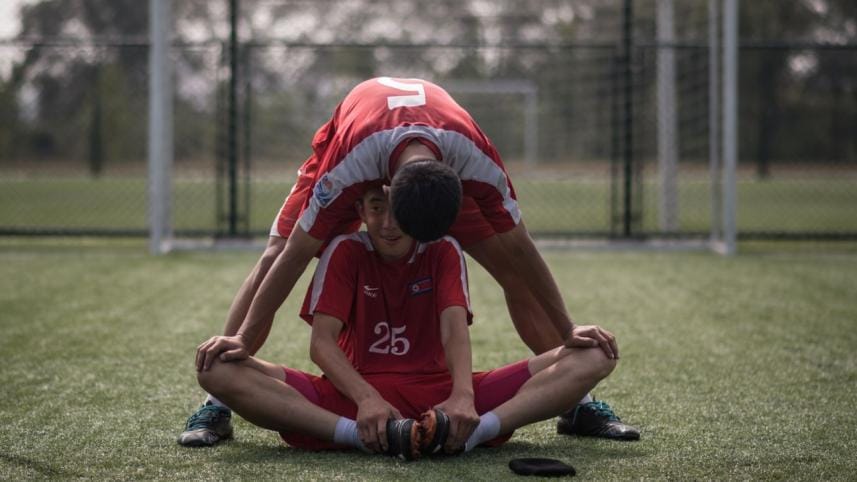Messi made in North Korea?

Undaunted by sanctions and hard realities on the pitch, North Korea's lone football academy has set its sights high -- producing players better than Lionel Messi, and teams that can dominate the world.
They are lofty goals for a country whose men's side is currently ranked 126th, sandwiched between Armenia and Ethiopia and -- more gallingly -- way below regional rivals South Korea, Japan and China.
But sporting success is a valuable propaganda tool and at the Pyongyang International Football School, which opened in 2013, coach Ri Yu-Il insists the sky's the limit.
"We are training our students to become super-talented players who can surpass the skills of people like Lionel Messi," said Ri, referring to the Barcelona superstar with four Ballon D'Or titles to his name.
"For now, I think we should dominate Asia and, in the near future, I hope that we will achieve global dominance," he added, during a tour of the training facility.
North Korea's finest hour was way back in 1966, when -- with Ri's father, Ri Chang-Myung, in goal -- they stunned mighty Italy 1-0 to reach the World Cup quarter-finals.
It was another 44 years before North Korea returned to the sport's biggest stage at the 2010 World Cup in South Africa, where they lost all three of their group games.
In the circumstances, producing players of Messi's standard is a stretch but 200 live-in students aged from nine to 15 -- 40 percent of them girls -- are doing their best at the Pyongyang academy.
Many of the training drills are familiar, but some activities are unusual -- like the children's tightly choreographed, formation ball-skills set to music which form part of the academy's publicity material.
Struck by lightning
When they're not playing on the artificial pitches, the students take lessons in classrooms adorned with pictures of North Korea's late leaders.
Despite the academy's efforts, the men's national coach, Norwegian-born Jorn Andersen, says they won't be turning out any global stars just yet.
"No, I don't think they can make a Lionel Messi, but I think they can make good players for Asia," Andersen told AFP in an interview.
"There are many talented players... but they always have to stay inside the country. They can't go out," he added, stressing the need to experience European football, which is "better and harder".
"When they are always playing inside (North Korea), it's difficult to create better players," said the former striker, who signed a one-year contract in May.
North Korea have had their share of controversies and they were barred from last year's Women's World Cup after five players failed drugs tests at the previous edition in 2011.
The team doctor at the time blamed the test results on a "Chinese remedy" made from musk deer glands to treat players who had been struck by lightning.
Last week, North Korea's U16 goalkeeper Jang Paek-Ho was fined and banned for a year for deliberately letting in a goal kick from his Uzbek opposite number, a comical incident which went viral on the internet.
One of North Korean football's main obstacles is a lack of matches: its clubs don't play Asian Football Confederation tournaments, and with just an 11-team league, domestic games are scant and draw crowds of only 200-300 spectators.
"My national players are with me but they don't get match practice. They are always training, training, training... but they don't play matches," said Andersen.
No plan B
Another major impediment is international sanctions imposed on North Korea over its nuclear weapons programme, which has seen two nuclear tests conducted this year.
In March, football's Zurich-based world governing body FIFA said it was withholding around $1.7 million earmarked for North Korean football development projects because of Swiss sanctions against the country.
And in May, the Italian parliament raised questions over a North Korean playing in the youth team of Serie A side Fiorentina -- saying the Pyongyang regime might be violating sanctions by skimming his wages.
The player left the side in July, according to a club spokesman who acknowledged there had been "some bureaucratic problems".
The Pyongyang academy had benefited from earlier FIFA funding, and Song Hye-Yong, an official for the national football association, acknowledged that it now faced some financing problems.
"Sanctions bring lots of difficulties to our country, including here," Song said.
Competition to enter the academy is intense, and even those who make it are subjected to a ruthless system of continual assessment. A number of students are sent home every year.
"It's inevitable that untalented players are eliminated," said coach Ri.
The best have a shot at making the national squad -- the main route to gathering some international experience, although a handful of North Koreans have been allowed to play for clubs abroad.
Although the prospects for the academy graduates are extremely limited, most are so fixated on representing their country that they appear to have no plan B if things don't work out.
"We came to succeed in football no matter what, so I have never thought about that," said a 15-year-old member of coach Ri's squad.




 For all latest news, follow The Daily Star's Google News channel.
For all latest news, follow The Daily Star's Google News channel.
Comments